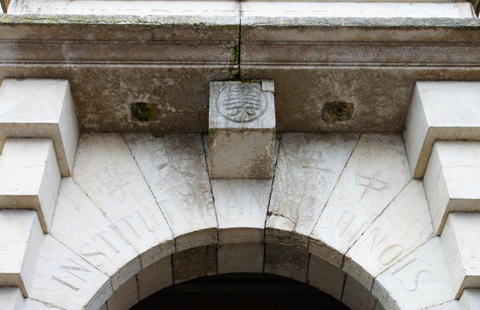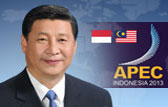What to expect from Xi's Europe visit
Updated: 2014-03-20 07:42
By Julia Marie Ewert (China Daily)
Comments Print Mail Large Medium Small
These are exciting times for EU-China relations. Just a few months ago, the two sides agreed to the 2020 Strategic Agenda. The second session of the 12th National People's Congress has just ended in China, and President Xi Jinping will visit Brussels at the end of this month, becoming the first Chinese president to visit the European Union headquarters. The course seems to be set for change.
But will Xi's visit fulfill expectations and push relations to a higher level? His visit to EU institutions will come at the end of a European tour which begins in The Hague with the Nuclear Security Summit on March 24-25. After that he will embark on a three-day visit to France, followed by visits to Germany and Belgium. Xi's intensive series of meetings with European leaders should enable both sides to discuss and agree to the priorities for their relationship. But with the crisis in Ukraine dominating international discussions, it may be difficult to focus on other topics when Xi meets EU leaders.
On the agenda for the meeting with the European Parliament President Martin Schulz are the political, parliamentary and commercial ties between the EU and China. Schulz is likely to bring up China's reticence on the situation in Ukraine and also raise the EU-China human rights dimension relations.
Xi's meeting with European Commission President Jose Manuel Barroso, European Council President Herman Van Rompuy and EU High Representative of the Union for Foreign Affairs and Security Policy Catherine Ashton is unlikely to bring about any substantive changes. At the last summit in November, both sides reaffirmed the importance of the strategic partnership established in 2003.
The ambitious EU-China 2020 Strategic Agenda awaits implementation, and the Bilateral Investment Treaty negotiations are the focal point of the trade agenda at the moment. Two rounds of negotiations have already been held, and while relations were augmented at last year's summit, it is now time to review the progress made and implement concrete projects.
The meeting is expected to discuss foreign policy and security issues, trade and investment relations, climate change, cyber security, sustainable and inclusive development, and people-to-people exchanges. The flagship urbanization partnership established in 2012 will be reviewed, especially because Premier Li Keqiang's Government Work Report named urbanization as one of China's nine major tasks for 2014.
On the foreign policy side, the leaders will discuss global hot spots such as Ukraine and Syria, as well as issues like security in East Asia. The EU and China are keen to expand their cooperation in foreign policy as can be seen from the first round of their new dialogue on the Middle East and North Africa. The two sides are expected to cooperate more closely on maritime and cyber security too.
Even though nothing radical is expected, Xi's landmark visit to Europe does underline the significance attached to EU-China partnership by both sides. It shows that China considers the EU an important political entity and the schedule of Xi's visit puts the EU in line with China's major bilateral partners France and Germany.
In Paris, Xi will have a t��te-��-t��te with French President Fran?ois Hollande and Foreign Minister Laurent Fabius. This year marks the 50th anniversary of diplomatic relations between France and the People's Republic of China as well as the 10th anniversary of their comprehensive strategic partnership.
But talks on the Conference of Parties to the United Nations Framework Convention on Climate Change (COP 21), to be held in Paris next year, are likely to dominate Xi's meeting. During the meeting on March 26, a �800-million investment contract between PSA Peugeot-Citroen and China's Dongfeng Motor Corporation is likely to be signed.
Sino-German ties have developed into what many call a "special relationship". Trade relations are booming and Sino-German high-level consultations are unparalleled. During a recent phone conversation, German Chancellor Angela Merkel and President Xi discussed the state of bilateral relations and the situation in Ukraine. Both leaders agreed on the importance of finding a peaceful resolution to the issue through dialogue.
Whether EU leaders or Germany alone can push China toward a more proactive stance on Ukraine is questionable. Beijing has to weigh its own respect for territorial integrity and national sovereignty in relation to its ties with Russia before taking a stance on the Ukraine crisis. China's abstention from the UN Security Council Resolution which condemned the referendum in Crimea was an "expression" of its reluctance to take sides. And Xi's visit to Europe is not expected to change that.
Yet in the run-up to Xi's visit to Germany, the situation in Ukraine is not the only problem confronting the international community. Another tricky issue could arise if China seeks to draw too close a parallel between the response of Germany and Japan to World War II. Germany, on its part, has no wish to be drawn into the Sino-Japanese dispute over islands in the East China Sea.
Looking at the bigger picture, Xi's visit to Europe comes relatively early in his presidency and thus offers him an opportunity to better understand the workings of the EU, cement relations with European leaders and build on these relations in the coming years. Yet with Ukraine grabbing the headlines and the only recently signed 2020 Strategic Agenda, Xi has a lot on his plate although expectations in Europe are rather low. Let us hope Xi makes the best of it.







